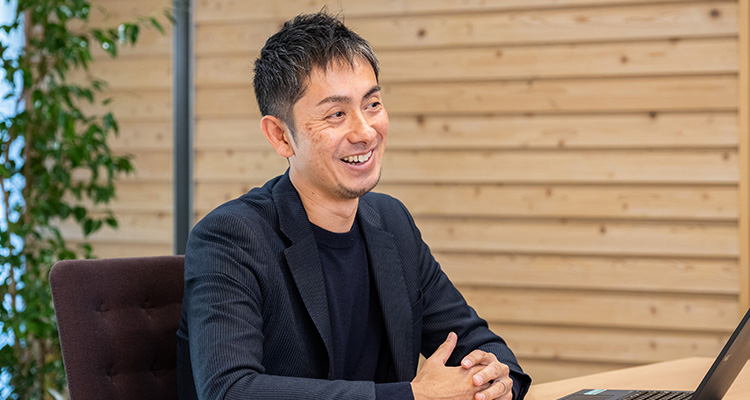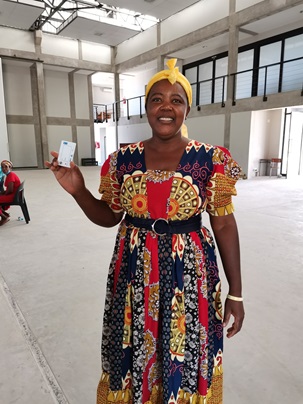Global Site
Breadcrumb navigation


Aligning the Right Technologies with the Right Partners to Solve the World's Social Issues
Over its 120-year history, NEC has developed many transformative technologies designed to deliver specific new values to society. But new problems constantly arise, and they often require either new solutions or new and creative ways to leverage existing solutions. In addition, solving many of these problems entails collaboration between multiple organizations.
Makoto Noda is head of the NEC Social Impact Business Group. Like a modern-day Renaissance artist, he blends creativity and innovative thinking to tackle some of the world's most complex issues. Let's look at how Makoto harnesses and applies state-of-the-art technology in sectors including global health and agriculture.
A world where leave no one behind
Makoto's role is to cooperate with international organizations, NGO, and other stakeholders to utilize NEC's large suite of technologies across business applications to advance the United Nations (UN) Sustainable Development Goals (SDGs).

"Our biggest mission is to realize a world in which leave no one behind," says Makoto. "To do that, we engage in co-creation projects with the UN, international organizations, and foundations. We work across a wide variety of sectors, including humanitarian aid, agriculture, industrial development, global health nutrition, and public safety. We're leveraging our technology to solve common social issues. This is in line with NEC's purpose to 'orchestrate a brighter world,' so it's connected to our mission and company goals."
Naturally, in orchestrating a brighter world, even a maestro like Makoto can't do it alone—finding the right ensemble of partners and stakeholders is key.
Cooperating with international organizations
Digital transformation can accelerate sustainable and inclusive development, according to the UN. As part of his pursuit of NEC's goals, Makoto wants to bridge the knowledge and understanding gap among public-sector, international organizations and private-sector companies working with them.
"There's a lack of alignment in understanding how technology can contribute to development work," says Makoto. "My biggest challenge is to bridge this gap and reach out to the right people in the UN. We have to work hard to overcome barriers in language, culture, and context, and communicate over what we as a tech company can cooperate with international organizations."
Boosting children immunization
What are some of the problems that Makoto and his team at NEC’s Social Impact Business Group are working to solve?
Roughly 20 million children under the age of five worldwide do not have formal IDs, leaving them “invisible” to systems that could provide them with life-saving vaccinations.
Solving this problem would require a combination of the right partner and the right technology— fortunately, Makoto and his team found both. In a milestone project for NEC, they developed a fingerprint-based identification technology for Gavi, the Vaccine Alliance. This technology was successfully integrated with Simprints’* fingerprint scanners.
Considering the young age of many of these children, fingerprint identification was the perfect technology for this use case. NEC’s world-leading fingerprint identification has since been used to register as many of these children as possible so they can be immunized.
“We have been doing trials of this program in Bangladesh as a proof-of-concept with the intention to roll it out to expansion of area and also other countries,” says Makoto. “Children not receiving critical vaccinations is a huge global health issue that must be addressed.”
*1 Simprints Technology Ltd.
Empowering small farmers by blockchain traceability

Another introduce the effort involves using blockchain technology in a pilot project to track the production of small-lot spice farmers in India. As the world's biggest spice exporter, India ships more than $4 billion worth of spices such as chili and turmeric each year. Even though these are important export crops, there was a high rejection rate due to insufficient quality control.
NEC worked with the international organization and the Indian government's agricultural authorities to launch a blockchain-based traceability program. For every product in the system, the farmer's identity, location, and quality-testing details are included, along with information on growing conditions, irrigation, pesticides, harvesting, and other factors.
"Because of lack of transparency of information and transactions surrounding the spice trade, many farmers face the critical issue of low income," says Makoto. "The blockchain traceability platform increases transparency, allowing farmers to sell their products at a higher price."
Improving maternal and child health and nutrition in Ghana

In the West African country of Ghana, malnutrition is a major concern. According to World Food Programme (WFP), over 24% of Ghana's population lives below the poverty line*.
A large part of the problem lies in education. By ensuring that caregivers understand nutrition along with children's health needs, they can provide better care.
To make this a reality, NEC partnered with the WFP, the Ajinomoto Foundation, and the Japanese medical equipment company Sysmex to improve knowledge about children's health among parents and caregivers. As a part of initiative, App with tablets and training to staff in health centers conducting health checkups are provided. This helps ensure health information is provided in a clear manner and leaves little room for misunderstanding about nutritional best practices.
Makoto and his team contributed to this effort by developing a nutritional training App. The App clearly displays health checkups results, and easy-to-follow nutrition instructions.
"The basic function of the tablets is to provide a health checkup, visualize the progress, follow up counseling, and standardize an optimal assessment." says Makoto. "This application can provide advice if mothers and children lack nutrition and severe anemia, and it can contribute nutritional improvement by promoting behavior change."
Strengthening farmer subsidies in Namibia

Meanwhile, in Southern Africa's Namibia, NEC is working with the international organization on the digital transformation of agriculture. To help small-scale farmers buy the seed and fertilizer they need to grow crops to earn a living and reduce food shortage, Namibia's Ministry of Agriculture had distributed paper-based subsidy vouchers to farmers nation-widely.
However, many vouchers wound up lost or unaccounted for, leading the government unable to accurately grasp how these subsidies were being used. Basically, the subsidy system was a great initiative that needed traceability. It was up to Makoto and his team to provide that.
The solution they developed allowed NEC to help the Namibian government and the international organization introduce 'e-Voucher' which provides the Farmer ID as an Android smartphone-based payment platform. Farmers can now purchase goods at participating retail shops using IC cards they receive. These cards keep an electronic record of each farmer's expenses, providing the traceability the system needed. Overall, this electronic scheme has contributed to making the operation more efficient and cost-effective.
"Duplication and manipulation can always happen with subsidy programs," says Makoto. "Digitizing the system allows the government to understand the situation and pursue effective policies while getting the funds to the right people."
Looking to the future
As the director of the Social Impact Business Group, Makoto's vision is to create an ecosystem and value chain for Social Impact business by partnering with the UN , the private and government sectors, and NPO. Finding the ideal stakeholders to solve specific problems and uniting them towards a common cause is a challenge that he embraces enthusiastically.
"We can do it, but we have to work more," says Makoto. "We go overseas to meet people and attend UN conference meetings and showcase what we can do. Because we all have the same goal of solving social issues."
NEC has both a wealth of technological expertise and the ability to support such organizations everywhere. With leaders like Makoto who are highly motivated and passionate in their mission to drive social change, NEC innovators and partners will continue to strive to create an inclusive world where leave no one behind.
Makoto Noda
Makoto Noda is head of the Global Relations Department's Social Impact Business Group at NEC's headquarters in Tokyo, where he oversees partnerships with international organizations. He has worked on international projects involving technologies such as AI, Internet of Things, blockchain, biometrics, and big data analytics for implementation in industries including agriculture, mobile communication, transport, and public health. During his time living in New York, he earned a Master of Public Administration (MPA) in international economic policy from Columbia University School of International and Public Affairs (SIPA) and served as a private-sector partnership advisor at the United Nations Development Programme.

Contact Us
 Ghana | World Food Programme (wfp.org)
Ghana | World Food Programme (wfp.org)